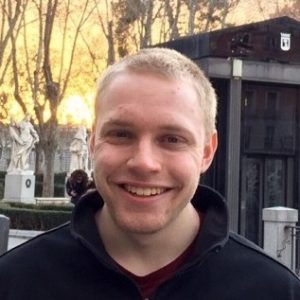DAC Student Spotlight: Joseph Weissman

Joseph Weissman, DAC master’s student in statistics
Joseph Weissman graduated from Virginia Tech in May 2018 with triple majors — mathematics, physics, and Computational Modeling and Data Analytics (CMDA).
“I really gravitated toward the machine learning side of my CMDA classes,” Weissman said. “And because I wanted to learn more about networks, I took Dr. Sengupta’s class on the subject during my last semester.”
His final project for the class evolved into the research project he is now working on as a master’s student at the Discovery Analytics Center, where he is advised by Srijan Sengupta.
“Often real world networks have densely connected core nodes and sparsely connected periphery nodes. We developed a hypothesis test to determine if a network exhibits this core-periphery structure,” Weissman said. “A network has core-periphery structure if it can be broken into a set of core nodes which are highly connected and periphery nodes which are sparsely connected.”
Since this method works for practically any network, he said, there are many applications. “One example we have been playing with is finding the core members of a social group,” Weisman said.
Last week at the Scientific Machine Learning conference at Brown University in Providence, Rhode Island, Weissman presented the work he has done Sengupta, “Core-Periphery Inference,” during a poster session for graduate students.
During the fall semester, Weissman was also busy helping Mark Embree, DAC faculty and professor of mathematics, design data science classes for the Virginia Tech Honors College Calhoun Discovery Program.
“I love working on challenging research projects with real world applications,” said Weissman, who held two internships last summer. As a data analyst intern for Capital One, he helped migrate data products to Amazon Web Services and, as a data analyst intern for a defense company, he worked on helping to solve deep learning problems.
Weissman expects to earn a master’s degree in mathematics in Spring 2019. Currently, he said, he is leaning toward working for a year before pursuing a Ph.D. in statistics.